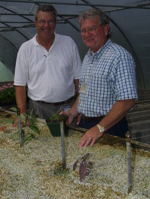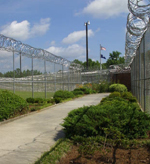Lieber partnership cultivates skills, senses
by Cindy AbolePublic Relations
Strolling through the grounds and sidewalks around MUSC can be compared to admiring the vibrant colors used in an impressionist artist’s canvas. The abundant flowers, trimmed lawns and shapely beds are a visual treat for the eyes and feast for the senses.
It reinforces the Chinese proverb: “He who plants a garden, plants happiness.”
Patches of petunias, melampodiums, gingkos, shasta and gerber daisies, geraniums, impatiens, dianthus’and colius’ adorn garden beds and pots throughout campus and have put on a show of their own this spring and summer.
 Lieber
Correctional Institution's Gene Frazier, left, and MUSC grounds supervisor
Tom Thurman check freshly propagated colius cuttings in the facility's
horticulture greenhouse.
Lieber
Correctional Institution's Gene Frazier, left, and MUSC grounds supervisor
Tom Thurman check freshly propagated colius cuttings in the facility's
horticulture greenhouse.
Coordinating the plants, gardening and maintenance of the institution’s greenery around this large urban, 67-acre campus is a daily feat for grounds supervisor Tom Thurman and his 14-member crew. And in these budget-challenged times, programs like his are struggling to survive and yet expected to be creative while remaining cost-conscious.
The plants and outdoor beauty are a result of a special partnership between the institution and an unlikely source: the horticulture program at Lieber Correctional Institution in Ridgeville.
These resplendent results are the efforts of Thurman and his capable grounds crew. Each morning, they can be found scattered throughout campus trimming hedges and trees, planting flowers, fertilizing, weeding or watering the grounds amid the din of power mowers.
The idea was the result of several coincidences: The possibility of Lieber prison closing down its horticulture program due to state budget cuts and MUSC’s search for simpler, cost-effective ways to maintain and beautify their grounds. The program is run and managed by Lieber’s Gene Frazier since its beginnings in 2000.
“So far, it’s been a great partnership,” said Thurman, a U.S. Navy retiree and former Lieber prison staffer and crisis intervention team negotiator. “I knew the horticulture program at Lieber was good and that’s why I was happy to find some way to help out. It’s a project I really believe in and am anxious to help it succeed.”
The partnership was coordinated under a one-year contract with an optional five-year extension. Working a season in advance, Thurman, with assistant grounds supervisor Peggy Wiggins, decides on what flowers and plants to use, and Lieber orders, grows and supplies the plants. The results are custom grown flowers at almost one-third the cost and thousands of dollars in savings.
Last fall and this past spring, flowers from Lieber adorned all corners of campus. Top on Thurman’s agenda was to improve and beautify the grounds and entrance at Harborview Tower, site of the university’s human resources department. The grounds crew shaped trees and bushes and created landscaped berms by planting a variety of colorful, seasonal plants that provide an inviting impression to potential employees, Thurman said.
Other areas of improvement include the rose garden in front of the employee parking garage on President street, the butterfly garden located at the Old Annex area and garden beds in front of the Institute of Psychiatry building.
“It’s great to hear that many people are praising our flowers and colors throughout campus,” said Frazier. “It gives us the opportunity to continue to help people and teach them to build upon skills that can hopefully guide them towards a second chance at making a productive life.”
MUSC coordinates two plantings for spring (April) and fall (October), keeping Lieber’s greenhouses full throughout most of the year. Further savings can be found in propagated plants. Earlier this summer, Wiggins brought Lieber different varieties of sun colius plants, a colorful annual. Frazier and his group were able to take cuttings from these plants and grow roots for them in special perlite-filled growing stations inside their greenhouse. After some time, the rooted cuttings will be transferred to containers where they will be grown to a certain size and used in summer plantings. Wiggins will next work with Lieber to grow some hibiscus plants from seeds
With the savings, Thurman is able to increase landscaped areas around campus by 10 percent, adding more color.
“So far, the partnership is working great,” Wiggins said, who visits the prison to check on plants prior to planting. “Working with Lieber staff and inmates is no different than dealing with any other local business. They’ve always treated us in a courteous, professional manner.
And what do the inmates working at Lieber’s horticulture program think?
 Lieber
inmates are responsible for landscaping some walk areas around the 60-plus
acre facility.
Lieber
inmates are responsible for landscaping some walk areas around the 60-plus
acre facility.
Although they can’t view it in person, both Thurman and Frazier have coordinated to provide photos of the flower beds and landscaping around campus. “The inmates get to see the outcome of their hard work and nurturing through pictures,” Frazier said. “They’re happy to see the results and it becomes rewarding to them.”
“This program gives inmates an experience and education that they can
value,” Thurman said, knowing that some ex-inmates have used their experiences
to continue working in horticulture. “It reminds us that inmates, although
incarcerated, are still humans in society and are capable of being rehabilitated.
With Gene’s help, I think we’re well on our way to accomplishing that.”
Catalyst Online is published weekly, updated as
needed and improved from time to time by the MUSC Office of Public Relations
for the faculty, employees and students of the Medical University of South
Carolina. Catalyst Online editor, Kim Draughn, can be reached at 792-4107
or by email, catalyst@musc.edu. Editorial copy can be submitted to Catalyst
Online and to The Catalyst in print by fax, 792-6723, or by email to petersnd@musc.edu
or catalyst@musc.edu. To place an ad in The Catalyst hardcopy, call Community
Press at 849-1778.